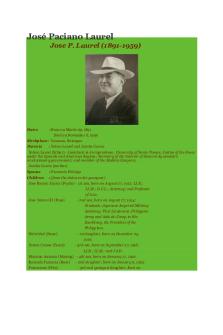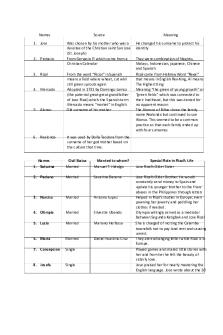Spriggs quiz - Key components of citing works and writing introductory/body paragraphs. PDF

| Title | Spriggs quiz - Key components of citing works and writing introductory/body paragraphs. |
|---|---|
| Author | judy pham |
| Course | Composition and Rhetoric I |
| Institution | Lone Star College System |
| Pages | 3 |
| File Size | 62.4 KB |
| File Type | |
| Total Downloads | 73 |
| Total Views | 117 |
Summary
Key components of citing works and writing introductory/body paragraphs....
Description
Pham 1 Judy Pham Professor Thrift ENGL-1301 5070 7 October 2019 Environmental Issues Caused by the Consumer Market In the article, “On Buying Local” by Katherine Spriggs, the overall argument is that the population of the United States should buy their products from small, local farms instead of relying on artificially imported products that fuel the destruction of the environment. Spriggs provides context by first explaining to the audience terms that she’ll be using and also what type of environment the world is going through due to the American consumer market deciding to not buy products locally. Not only so, but she also uses statistics and information from various sources from various years to prove the ongoing problems of the environment based on just the changing consumer market in the United States to strengthen the audience’s understanding of the context before thoroughly going into her argument. Of course, there are other countries contributing to the breakdown of the environment, but America is rather infamous for problems such as “global warming, pollution, and dwindling fossil fuels” (Spriggs 150). In order to reduce those issues, she urges citizens to buy locally. She argues that “buying local, for example, would reduce the high cost of fuel and energy used to transport food across the world and would bring long term benefits as well” (Spriggs 154). Which is rather true. In buying locally, there would be no such thing as far shipments from farms to stores. There is so much fuel being wasted on huge trucks travelling hundreds, if not, possibly thousands of miles, to do imports and exports just alone in the United States. If people just went to local farms for products, that would reduce the tremendous amount of (essentially) wasted fossil fuels as well as toxic gasses being released into
Pham 2 the environment. Spriggs backs up her argument with another valid point that “small farmers tend to value local natural resources more than industrial scale farmers do and are therefore more conscientious in their farming methods” (Spriggs 153-154). What she means is that with local farmers, nothing really goes to waste, local farmers usually don’t plant or raise a huge number of products to where it will end in excess amounts of it; they try to utilize everything they have. In comparison, the huge farms usually waste lots of food as well as have unhealthy working habits. For example, “labor is cheap in third world countries and large U.S. farms are notorious for hiring immigrant laborers” (Spriggs 156). They just exploit the immigrants for something that is terrible for the environment. Sure, it creates jobs, but workers don’t even get paid the actual amounts that they deserve. Making money and possibly artificial products in this heartless method has already been looked down upon on by society for years but now that it has been happening for so long, it has transformed into a contribution of horrible environmental issues.
Pham 3 Work Cited Spriggs, Katherine. “On Buying Local.” Everyone’s an Author With Readings, edited by Andrea Lunsford, et al., 2nd ed., W. W. Norton, 2017, pp. 150-158....
Similar Free PDFs

Italian writing paragraphs
- 1 Pages

12 Key Components of IDEA
- 4 Pages

jose p laurel life works and writing
- 24 Pages

Life and Works of Rizal
- 57 Pages

Works of Luna and Amorsolo
- 1 Pages

Life and Works of Rizal
- 16 Pages

Life and works of rizal
- 3 Pages

Components of a Product
- 5 Pages

Components of a Microcomputer
- 4 Pages
Popular Institutions
- Tinajero National High School - Annex
- Politeknik Caltex Riau
- Yokohama City University
- SGT University
- University of Al-Qadisiyah
- Divine Word College of Vigan
- Techniek College Rotterdam
- Universidade de Santiago
- Universiti Teknologi MARA Cawangan Johor Kampus Pasir Gudang
- Poltekkes Kemenkes Yogyakarta
- Baguio City National High School
- Colegio san marcos
- preparatoria uno
- Centro de Bachillerato Tecnológico Industrial y de Servicios No. 107
- Dalian Maritime University
- Quang Trung Secondary School
- Colegio Tecnológico en Informática
- Corporación Regional de Educación Superior
- Grupo CEDVA
- Dar Al Uloom University
- Centro de Estudios Preuniversitarios de la Universidad Nacional de Ingeniería
- 上智大学
- Aakash International School, Nuna Majara
- San Felipe Neri Catholic School
- Kang Chiao International School - New Taipei City
- Misamis Occidental National High School
- Institución Educativa Escuela Normal Juan Ladrilleros
- Kolehiyo ng Pantukan
- Batanes State College
- Instituto Continental
- Sekolah Menengah Kejuruan Kesehatan Kaltara (Tarakan)
- Colegio de La Inmaculada Concepcion - Cebu






